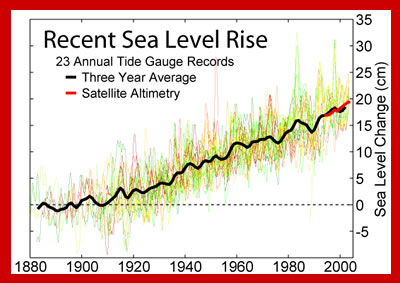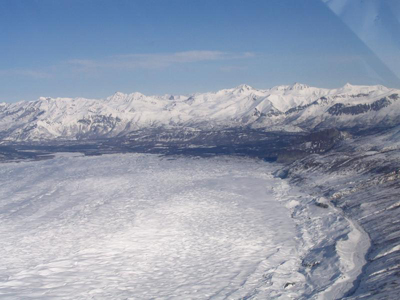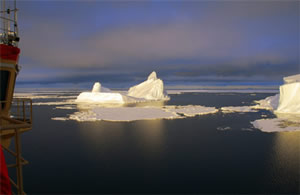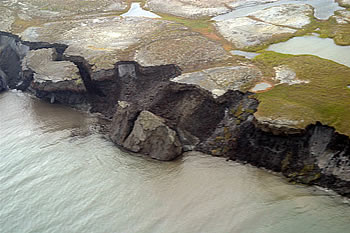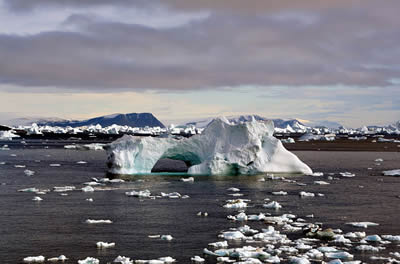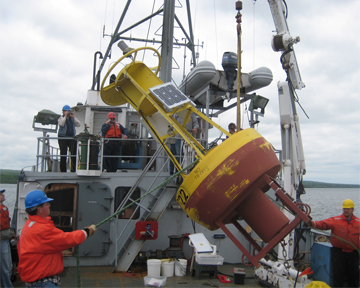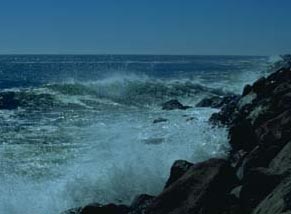Click on image for full size
Courtesy of Lisa Gardiner
Related links:
Intergovernmental Panel on Climate Change (IPCC)
Rising Temperature in Large Lakes
Greenland's Ice Is Melting Faster
Tropics May Be Next Hotspot for Disease Outbreaks (Podcast from NSF)
Global Warming Affects World's Largest Freshwater Lake
Movie: Is Climate Change Involved with Amphibian Deaths?
A New Plan to Help Earth’s Changing Climate
Exploring Ocean Dead Zones video
Fossil Record Suggests Insect Assaults Foliage May Increase with Warming Globe
Our Changing Planet - Key Indicators of Climate Change
Wildfires - Why are they a challenge to stop? Classroom Activity
Effects of Climate Change Today
Have you ever taken your temperature to see if you are getting sick? Scientists have been taking the Earth's temperature and have found that it is getting warmer. During the past 100 years, the Earth's temperature has risen more than half a degree Celsius (or about one degree Fahrenheit). This may not sound like very much but it is changing our world. Here are some effects of global warming that scientists see happening now.
- Sea level is rising. During the 20th century, sea level rose about 15 cm (6 inches) due to melting glaciers and expansion of warmer seawater. It could rise much more than that in the next 100 years.
- Arctic sea ice is melting. The summer thickness of sea ice is about half of what it was in 1950. This is causing the Arctic to warm up faster.
- Glaciers and permafrost are melting. Over the past 100 years, mountain glaciers in all areas of the world have shrunk and so has the amount of permafrost in the Arctic. Greenland's ice sheet is melting faster too.
- The ocean is warming. Warmer waters in the shallow oceans make coral reefs less healthy. About a quarter of the world's coral reefs have died in the last few decades.
- The temperatures of large lakes are warming. The temperatures of large lakes world-wide have gone up a lot. This can increase algal blooms in lakes and lower lake levels.
- More rain causes flooding. Warmer temperatures have caused more intense rainfall in some places. This can cause flooding.
- Extreme drought is increasing. Higher temperatures cause a higher rate of evaporation and more droughts in some areas of the world.
- Crops are withering. Warmer temperatures and drier soil are causing crops around the world to wither. Less crops mean there is less food for people to eat.
- Ecosystems are changing. As temperatures warm, animals and plants may either look for a cooler place to live or die. Species that are vulnerable include endangered species, coral reefs, and polar animals. Warming has also caused changes in the timing of spring events and the length of the growing season.
- Hurricanes have changed in frequency and strength. There is evidence that the number of intense hurricanes has increased in the Atlantic since 1970. Scientists continue to study whether climate is the cause.
- More frequent heat waves. It is likely that heat waves have become more common in more areas of the world.
- Seawater is becoming more acidic. When carbon dioxide, a greenhouse gas, gets into the oceans, it makes the water more acidic. This could impact coral reefs and other marine life.







